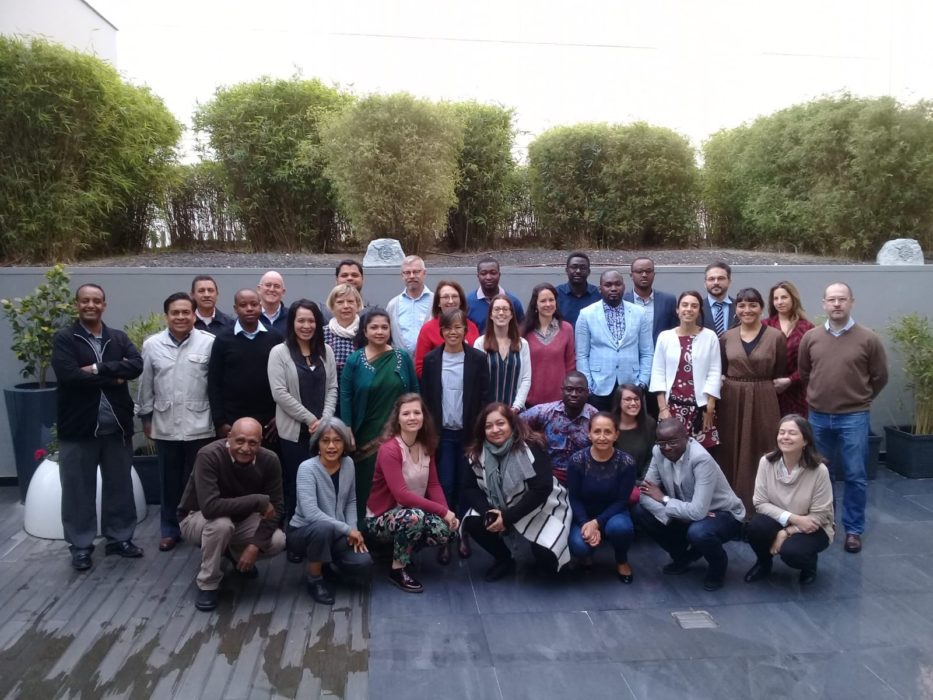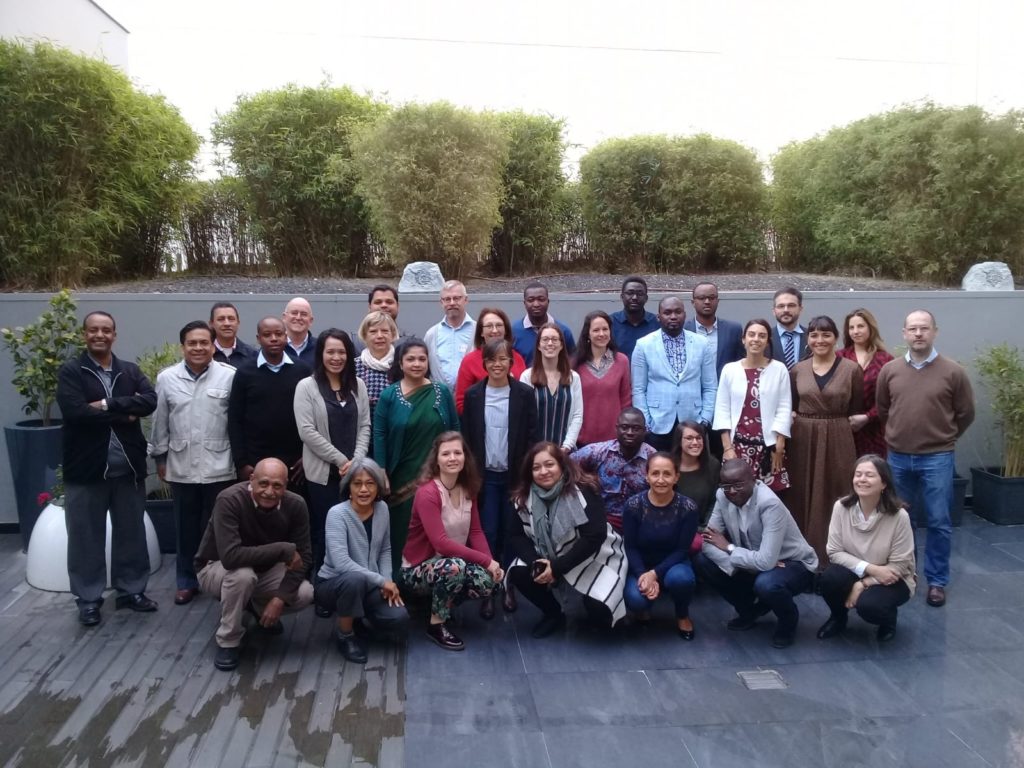

Team members of the EU-funded Capacity Development for Agricultural Innovation Systems (CDAIS) project met from the 18thto 22nd February 2019 in the heart of Lisbon, a few metres from the renowned ‘Ponto 25 de Abril’ suspension bridge, often compared to the Golden Gate Bridge in San Francisco. This also offers a rather appropriate image that describes the endeavour of the CDAIS team, entirely dedicated to ‘building bridges for change’.
The week-long event was a combination of meetings with the project oversight committee meeting on Monday, the global task team meeting on Tuesday to Thursday, and parallel sessions on Friday with a CDAIS-Agrinatura business meeting, and an integrated MEL-Communications meeting. The project oversight committee is composed of representatives from Agrinatura, the Tropical Agriculture Platform (TAP) and the Food and Agriculture Organization of the United Nations (FAO). The Global Task Team meeting was attended by country and coordination teams represented by some of the the Agrinatura Focal Persons (AFPs), Country Project Managers (CPMs), Lead National Innovation Facilitators (NIFs) and focal persons for the Monitoring, Evaluation and Learning (MEL) together with the CDAIS Coordination team from Montpellier and the FAO team from Rome . Agrinatura was represented by Huub Lofler who chaired the Project Oversight Committee meeting on Monday and gave an introductory speech on Tuesday.

A week-long programme: the CDAIS team on the pathway to impact
The Project Oversight Committee meeting reviewed the progress of the project towards its planned end date on 31 August 2019, highlighted by discussions about the CDAIS International Forum to be held on 13-14 May 2019 in Gembloux, Belgium.
Global Task Team members were welcomed in Lisbon by the President of the School of Agriculture in Lisbon (ISA), Antonio Guerreiro de Brito. The meeting began with a session on country updates aimed to draw out the ‘on-the-ground’ realities and reflect against the theoretical common framework, with questions raised. What are the outcomes from the countries at the innovation niche partnership, organizational, agricultural innovation systems, and policy dialogue level? What were the main constraints, challenges and opportunities identified and acted upon? How were the methods and tools adapted and used within each country context?
During discussions, lessons learnt were shared by country partners and common challenges were drawn out. For instance, at the niche partnership level, pragmatic changes are appreciated by actors, at organizational level there is awareness of the need for strengthened innovation support services, and at the policy level is a need for expanding the policy dialogue, strengthening the presence of the government at the niche level, and deepening the implications of stakeholders at local and national level.
The team also looked into the last phase of the monitoring, evaluation and learning (MEL) framework of the project. They reviewed key MEL concepts, methodology and the contribution analysis (see Box 1). During this session, some issues were addressed. How can we ensure consistency in terminologies and validate qualified observations with numbers? How to distinguish outputs and capacity development activities? How do we relate these activities with functional capacities development and innovation processes?
Box 1. Excerpt from MEL presentation.
As explained in previous workshops, this final MEL exercise at the end of the project will help capture the effects of CDAIS in each country and provide bases for the cross-country analysis, which will give insights to investors, policy makers and implementation agencies on the impact of strengthening functional capacities in agricultural innovation systems (AIS). This transversal analysis will:
Þ Deepen the understanding of the impact pathways of the CDAIS project in each country.
Þ Show how the dual pathway approach of reinforcing functional capacity and the enabling environment can both influenceinnovation processes and the innovation systems.
Þ Display the diversity and the similarities of the various impact pathways and identify the potential for replication in the current or other countries.
Þ Provide analyses as to how the TAP Common Framework can help further projects to provide even more efficient and effective interventions to develop functional capacities and innovation systems.
Working groups sessions were conducted to ensure full appropriation of the MEL tools and methodologies by the CDAIS country teams’ members. They allowed participants in their respective countries to practice the tools, step back and reflect on the primary and expanded outcomes of their activities on the field, and on their long-term impacts, taking into account the notion of irreversibility of change.

On Thursday, the programme focused on the CDAIS Communication Strategy and the organization of the National forums and the CDAIS International Forums In preparation for the latter, working groups sessions were conducted on the three Forum sub-themes: (1) concepts, ideas, frameworks, (2) implementation realities, and (3) assessing change. The following questions were addressed by each group: What exactly are we talking about? What is the key message we want to transmit? What experts could join us to share and discuss? Who are going to join the working groups?
The week ended with a closed Agrinatura members’ business meeting to coordinate the details of the management of the last steps of the CDAIS project. In parallel, another MEL meeting was held to plan ahead for the remaining months of the project, set the dates for the national forums and ensure the interlinkages between the MEL analyses and the storytelling approach of Conversations of Change.
On the road to Gembloux…
The CDAIS project is in its final phase of implementation. On this highway to completion, the global partnership will be counting on all its team members’ stamina to bring activities to a full and fruitful conclusion, when the team gives global exposure to its project results.
The final rendezvous – the CDAIS International Forum – will take place on 13-14 May 2019 in Gembloux, Belgium!
